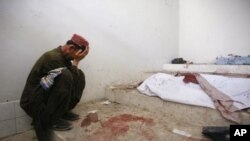Police say they have detained some 170 suspects in connection with Wednesday's suicide bombings that killed 28 people in the southwestern Pakistani city of Quetta.
Senior police official Hamid Shakil told VOA on Thursday that many of those being questioned are Afghan refugees.
Two suicide bombers attacked the home of Farrukh Shehzad, the deputy head of Baluchistan province's paramilitary Frontier Corps, on Wednesday. Police say one of the assailants was carrying an identity card indicating he was from Afghanistan's Kunduz province.
Shehzad was wounded and his wife was killed in the attack. More than 80 other people were wounded in the two blasts.
The Pakistani Taliban said it carried out the attack in retaliation for the recent arrest of al-Qaida operatives in Quetta.
On Monday, Pakistan's military announced that the Frontier Corps had helped arrest senior al-Qaida leader Younis al-Mauritani and two other al-Qaida militants in Quetta, the capital of Baluchistan province.
Mauritani was believed to have been tasked by al-Qaida leader Osama bin Laden with targeting economic interests in the United States, Europe and Australia.
Pakistan's military did not say when the arrests were made, but said the operation was "planned and conducted with technical assistance of U.S. intelligence agencies."
The White House on Monday praised the operation as an example of the longstanding partnership between the U.S. and Pakistan in fighting terrorism.
The United States strongly condemned Wednesday's suicide bombings, calling them "horrific."
United Nations Secretary-General Ban Ki-moon also strongly condemned the attacks in Quetta.
His spokesman said Thursday that the U.N. chief is deeply saddened by the continued loss of Pakistani lives at the hands of terrorism. Mr. Ban also commended the Pakistani government's efforts to combat terrorism.




